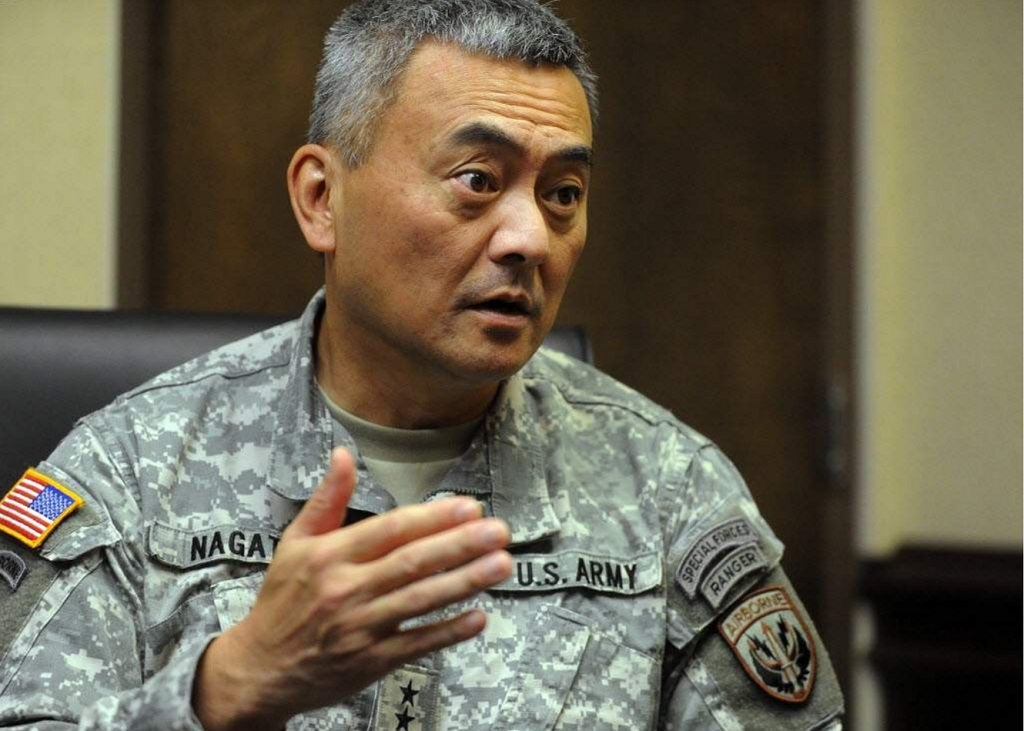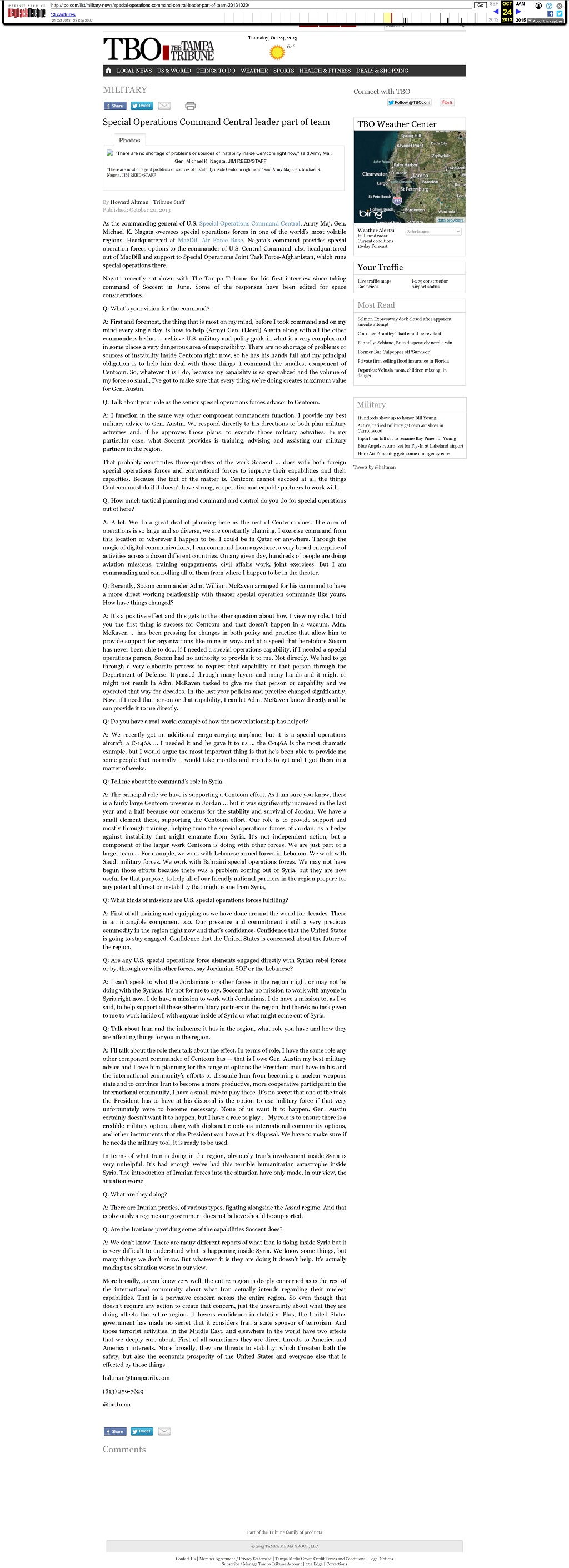Military

As the commanding general of U.S. Special Operations Command Central, Army Maj. Gen. Michael K. Nagata oversees special operations forces in one of the world’s most volatile regions. Headquartered at MacDill Air Force Base, Nagata’s command provides special operation forces options to the commander of U.S. Central Command, also headquartered out of MacDill and support to Special Operations Joint Task Force-Afghanistan, which runs special operations there.
Nagata recently sat down with The Tampa Tribune for his first interview since taking command of Soccent in June. Some of the responses have been edited for space considerations.
Q: What’s your vision for the command?
A: First and foremost, the thing that is most on my mind, before I took command and on my mind every single day, is how to help (Army) Gen. (Lloyd) Austin along with all the other commanders he has … achieve U.S. military and policy goals in what is a very complex and in some places a very dangerous area of responsibility. There are no shortage of problems or sources of instability inside Centcom right now, so he has his hands full and my principal obligation is to help him deal with those things. I command the smallest component of Centcom. So, whatever it is I do, because my capability is so specialized and the volume of my force so small, I’ve got to make sure that every thing we’re doing creates maximum value for Gen. Austin.
Q: Talk about your role as the senior special operations forces advisor to Centcom.
A: I function in the same way other component commanders function. I provide my best military advice to Gen. Austin. We respond directly to his directions to both plan military activities and, if he approves those plans, to execute those military activities. In my particular case, what Soccent provides is training, advising and assisting our military partners in the region.
That probably constitutes three-quarters of the work Soccent … does with both foreign special operations forces and conventional forces to improve their capabilities and their capacities. Because the fact of the matter is, Centcom cannot succeed at all the things Centcom must do if it doesn’t have strong, cooperative and capable partners to work with.
Q: How much tactical planning and command and control do you do for special operations out of here?
A: A lot. We do a great deal of planning here as the rest of Centcom does. The area of operations is so large and so diverse, we are constantly planning. I exercise command from this location or wherever I happen to be, I could be in Qatar or anywhere. Through the magic of digital communications, I can command from anywhere, a very broad enterprise of activities across a dozen different countries. On any given day, hundreds of people are doing aviation missions, training engagements, civil affairs work, joint exercises. But I am commanding and controlling all of them from where I happen to be in the theater.
Q: Recently, Socom commander Adm. William McRaven arranged for his command to have a more direct working relationship with theater special operation commands like yours. How have things changed?
A: It’s a positive effect and this gets to the other question about how I view my role. I told you the first thing is success for Centcom and that doesn’t happen in a vacuum. Adm. McRaven … has been pressing for changes in both policy and practice that allow him to provide support for organizations like mine in ways and at a speed that heretofore Socom has never been able to do… if I needed a special operations capability, if I needed a special operations person, Socom had no authority to provide it to me. Not directly. We had to go through a very elaborate process to request that capability or that person through the Department of Defense. It passed through many layers and many hands and it might or might not result in Adm. McRaven tasked to give me that person or capability and we operated that way for decades. In the last year policies and practice changed significantly. Now, if I need that person or that capability, I can let Adm. McRaven know directly and he can provide it to me directly.
Q: Do you have a real-world example of how the new relationship has helped?
A: We recently got an additional cargo-carrying airplane, but it is a special operations aircraft, a C-146A … I needed it and he gave it to us … the C-146A is the most dramatic example, but I would argue the most important thing is that he’s been able to provide me some people that normally it would take months and months to get and I got them in a matter of weeks.
Q: Tell me about the command’s role in Syria.
A: The principal role we have is supporting a Centcom effort. As I am sure you know, there is a fairly large Centcom presence in Jordan … but it was significantly increased in the last year and a half because our concerns for the stability and survival of Jordan. We have a small element there, supporting the Centcom effort. Our role is to provide support and mostly through training, helping train the special operations forces of Jordan, as a hedge against instability that might emanate from Syria. It’s not independent action, but a component of the larger work Centcom is doing with other forces. We are just part of a larger team … For example, we work with Lebanese armed forces in Lebanon. We work with Saudi military forces. We work with Bahraini special operations forces. We may not have begun those efforts because there was a problem coming out of Syria, but they are now useful for that purpose, to help all of our friendly national partners in the region prepare for any potential threat or instability that might come from Syria,
Q: What kinds of missions are U.S. special operations forces fulfilling?
A: First of all training and equipping as we have done around the world for decades. There is an intangible component too. Our presence and commitment instill a very precious commodity in the region right now and that’s confidence. Confidence that the United States is going to stay engaged. Confidence that the United States is concerned about the future of the region.
Q: Are any U.S. special operations force elements engaged directly with Syrian rebel forces or by, through or with other forces, say Jordanian SOF or the Lebanese?
A: I can’t speak to what the Jordanians or other forces in the region might or may not be doing with the Syrians. It’s not for me to say. Soccent has no mission to work with anyone in Syria right now. I do have a mission to work with Jordanians. I do have a mission to, as I’ve said, to help support all these other military partners in the region, but there’s no task given to me to work inside of, with anyone inside of Syria or what might come out of Syria.
Q: Talk about Iran and the influence it has in the region, what role you have and how they are affecting things for you in the region.
A: I’ll talk about the role then talk about the effect. In terms of role, I have the same role any other component commander of Centcom has — that is I owe Gen. Austin my best military advice and I owe him planning for the range of options the President must have in his and the international community’s efforts to dissuade Iran from becoming a nuclear weapons state and to convince Iran to become a more productive, more cooperative participant in the international community, I have a small role to play there. It’s no secret that one of the tools the President has to have at his disposal is the option to use military force if that very unfortunately were to become necessary. None of us want it to happen. Gen. Austin certainly doesn’t want it to happen, but I have a role to play … My role is to ensure there is a credible military option, along with diplomatic options international community options, and other instruments that the President can have at his disposal. We have to make sure if he needs the military tool, it is ready to be used.
In terms of what Iran is doing in the region, obviously Iran’s involvement inside Syria is very unhelpful. It’s bad enough we’ve had this terrible humanitarian catastrophe inside Syria. The introduction of Iranian forces into the situation have only made, in our view, the situation worse.
Q: What are they doing?
A: There are Iranian proxies, of various types, fighting alongside the Assad regime. And that is obviously a regime our government does not believe should be supported.
Q: Are the Iranians providing some of the capabilities Soccent does?
A: We don’t know. There are many different reports of what Iran is doing inside Syria but it is very difficult to understand what is happening inside Syria. We know some things, but many things we don’t know. But whatever it is they are doing it doesn’t help. It’s actually making the situation worse in our view.
More broadly, as you know very well, the entire region is deeply concerned as is the rest of the international community about what Iran actually intends regarding their nuclear capabilities. That is a pervasive concern across the entire region. So even though that doesn’t require any action to create that concern, just the uncertainty about what they are doing affects the entire region. It lowers confidence in stability. Plus, the United States government has made no secret that it considers Iran a state sponsor of terrorism. And those terrorist activities, in the Middle East, and elsewhere in the world have two effects that we deeply care about. First of all sometimes they are direct threats to America and American interests. More broadly, they are threats to stability, which threaten both the safety, but also the economic prosperity of the United States and everyone else that is effected by those things.
Editor’s Note: Updated Links — United States Special Operations Command — USSOCOM (2023) , MacDill Air Force Base (2023)

Original URL: http://tbo.com/list/military-news/special-operations-command-central-leader-part-of-team-20131020/

